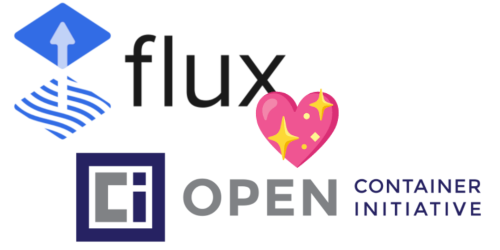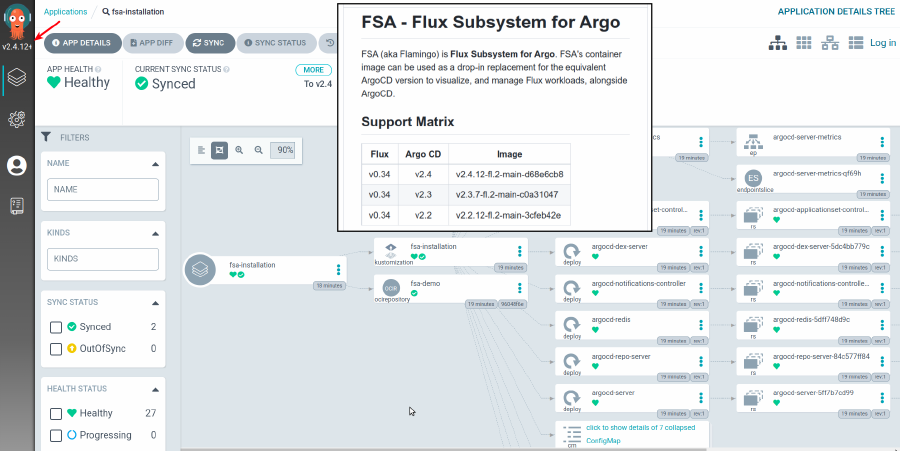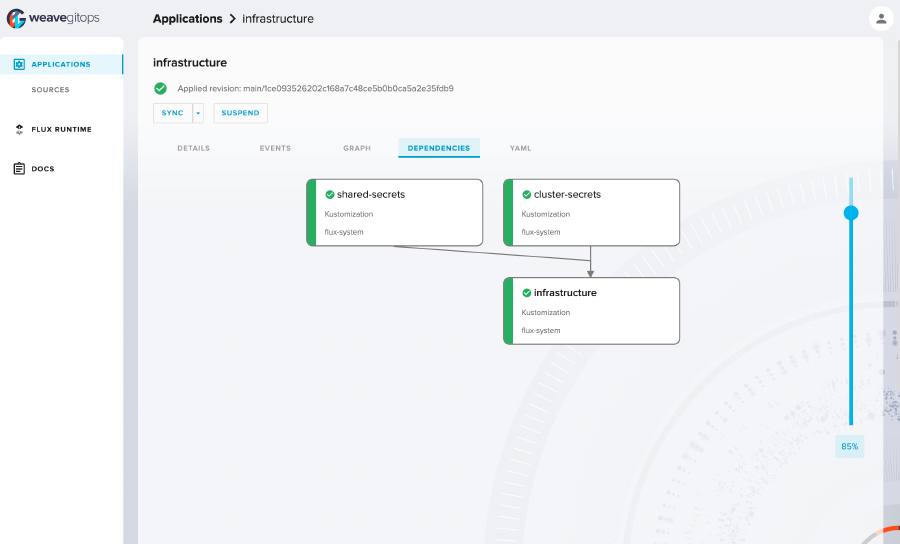You are viewing documentation for Flux version: 2.1
Version 2.1 of the documentation is no longer actively maintained. The site that you are currently viewing is an archived snapshot. For up-to-date documentation, see the latest version.
This article is more than one year old. Older articles may contain outdated content. Check that the information in the page has not become incorrect since its publication.
September 2022 Update
As the Flux family of projects and its communities are growing, we strive to inform you each month about what has already landed, new possibilities which are available for integration, and where you can get involved. Read our last update here.
It’s the beginning of October 2022 - let’s recap together what happened in September - it has been a lot!
News in the Flux family
Flux v0.34.0 and 0.35.0 bring OCI improvements

Flux v0.35 and Flux v0.34 landed in September. They bring tons of improvements, especially in the area of OCI. We encourage everyone to upgrade for the best experience.
Please note: there are breaking changes: The Flux controller logs have been aligned with the Kubernetes structured logging. For more details on the new logging structure please see: fluxcd/flux2#3051.
Here is a quick summary of what you can look forward to in terms of features and improvements:
- Verify OCI artifacts signed by Cosign (including
keyless- currently still experimental and only supporting GCP and GHCR) with OCIRepository.spec.verify. Note this supports contextual login, but not insecure registries. - Allow pulling Helm charts dependencies from HTTPS repositories with mixed self-signed TLS and public CAs.
- Allow pulling Helm charts from OCI artifacts stored at the root of AWS ECR.
- Allow running bootstrap for insecure HTTP Git servers with
flux bootstrap git --allow-insecure-http --token-auth. - Improve health checking for global objects such as
ClusterClass,GatewayClass,StorageClass, etc. - The controllers and the Flux CLI are now built with Go 1.19.
- Allow pulling artifacts from an in-cluster Docker Registry over
plain HTTP with
OCIRepository.spec.insecure. - Allow defining OCI sources for non-TLS container registries with
flux create source oci --insecure. - Enable contextual login when publishing OCI artifacts from a Cloud
VM using
flux push artifact --provider=aws|azure|gcp. - Prioritise static credentials over OIDC providers when pulling OCI artifacts from container registries on multi-tenant cluster.
- Reconcile Kubernetes Class types (
ClusterClass,GatewayClass,StorageClass, etc) in a dedicated stage before any other custom resources likeClusters,Gateways,Volumes, etc. - When multiple SOPS providers are available, run the offline decryption methods first to avoid failures due to KMS unavailability.
- Add finalizers to the notification API to properly record the reconciliation metrics for deleted resources.
- Publish the Flux install manifests as OCI artifacts on GitHub and
DockerHub container registries under
fluxcd/flux-manifests.
For more information on OCI and Cosign support please see the Flux documentation.
It took us six months to debate, design and implement OCI support in Flux. Big thanks to all the Flux contributors that helped us reach this milestone!
Flux Legacy (v1) Retirement Plan
Thanks to so many of you who have been migrating to the latest Flux version, often in conversation with us. We appreciate your enthusiasm for the increased capabilities of Flux. In October 2020 we put Flux Legacy and Helm operator into maintenance mode (cf flux#3320 and helm-operator#546). Back then we promised to continue to support them for 6 months once we reached feature-parity across all former feature sets, and instead we have offered extended support for over a year.
We reached parity in March 2021 and announced stable APIs in July 2021. Since then we added OCI support and many other modern features to Flux v2. Thanks to you not only for migrating, but also for adding yourselves to the latest Flux adopters page! We really appreciate it. Your work has brought down the number of support requests for legacy Flux to 5% of all volume in the past year.
We will archive Flux Legacy in November this year. If you still need migration help, there are still free migration workshops, or reach out for paid support to one of the companies listed here.
Some recent prompts for this include:
- Some of the Flux v1 dependencies are pinned to EOL versions, which cannot be upgraded without causing regressions or a cascading amount of changes to the codebase.
- All Kubernetes dependencies are pinned within version v1.21. That version already reached end-of-life support upstream.
Thanks for joining us on this journey of building Flux. Please give Flux a star!
Flux Ecosystem
Flux Subsystem for Argo
The team is happy to announce that Flux Subsystem for Argo (FSA) is now on-par with ArgoCD regarding supported versions. FSA now provides all versions supported by ArgoCD. The project will provide security updates based on ArgoCD v2.2 and v2.3, and for the active ArgoCD version (currently v2.4), FSA will support them, starting from v2.4.12.
For Flux compatibility, FSA will be tested against every release of future Flux versions.

Weave GitOps
Weaveworks just released version v0.9.6 for Weave GitOps. There are a lot of great new features that have been released in the last month. First, it is continuing the trend of being a feature rich Flux UI by adding support for Flux Providers and Alerts. When you click on the user icon you are then taken to a screen that contains those objects. As a platform operator, you can easily understand where events are being sent.
On the kustomization and helm release detail pages there is now a tab to
check your dependencies for those objects. The dependsOn is a
powerful feature in Flux and now you can easily see these visualised
within the application. We’re also making it easy to navigate from these
graphs to relevant objects in a near future release.

In addition, the team added numerous improvements to gitops run our live
coding environment. Now you can run the command against an empty folder
and it will generate a kustomization.yaml file and give you a live
connection between that working directory and the cluster you are
connected to. The team is full steam ahead on the next set of features
for the run experience.
Terraform Controller
The Weave GitOps team is continuing to improve our ecosystem of controllers with the latest release of the tf-controller v0.12.0.
The notable features in this release are: custom backend support,
interop with Notification controller, and support human readable plan
output in ConfigMap. This is all new:
- Enable custom backends for Terraform
- Support
backendConfigsFromfor specifying backend configuration from Secrets - Add a parameter for specifying max gRPC message size, default to 4MB
- Implement
force-unlockfortfstatemanagement - Fix the initialization status
- Recording events to support Flux notification controller
- Support specifying targets for plan and apply
- Add node selector, affinity and tolerations for the runner pod
- Add volume and volumeMounts for the runner pod
- Add file mapping to map files from Secrets to home or workspace directory
- Fix Plan prompt being overridden by the progressing message
- Support storing human-readable plan output in a ConfigMap
Learn more at the following blog post “How to GitOps Your Terraform”, by Priyanka Ravi & Daniel Holbach.
Weave GitOps Enterprise
The Weave GitOps Enterprise continues to build on top of the OSS feature set with its latest v0.9.5 release. First, the team has added a new add application button with support for both Kustomizations and Helm Releases. This makes it super easy to add the relevant Flux primitives to get your applications loaded onto the cluster(s) of your choice.
Workspaces were added as well. This makes it super easy to manage multi-tenancy on Weave GitOps Enterprise. It is built on top of Flux’s tenancy model with a lot of extra flexibility and power. For example, all of your workspaces can be defined in one or more files. We then have a simple CLI command that will generate all of the necessary YAML for you. This includes advanced features such as policies to ensure full compliance within the tenant. You can define which repositories your users can use as well as which clusters applications can be deployed to. To learn more about this feature check out the documentation.
You can also now define pipelines and environments for Helm Charts. This will allow your application teams to see how things are rolled out across dev, staging, and production environments; or however you choose to define your environments. There will be a lot of continued efforts in this area so stay tuned.
Your engineering teams are able to see policy violations for applications across clusters. Policy sets can be used by platform operators to define in one place whether policies are for auditing purposes or should be blocked by the admission controller. The team built out a profile for making it easy to set up policy dashboards using the ELK stack. Platform operators now have greater flexibility when configuring the same policy with different values for different clusters.
VS Code GitOps Extension
A lot of great features have been added to the extension, most notably support for OCI and Azure. Please see the recent blog post in our ecosystem category for more details.
Recent & Upcoming Events
It’s important to keep you up to date with new features and developments in Flux and provide simple ways to see our work in action and chat with our engineers.
Recent Events (ICYMI) 📺
We feel blessed to have such a big community of users, contributors and integrators and so many are happy to talk about their experiences. In September here are a couple of talks we would like to highlight.
- CNCF On-Demand Webinar (Sep 15): Flux increased security &
scalability with OCI
Flux is trusted for its high levels of security, and new OCI support brings even greater GitOps security and scalability. Max Jonas Werner covers the benefits like more streamlined repo structure options and better ways to manage breaking changes in your app. - CNCF On-Demand Webinar (Sep 29) How to GitOps Your
Terraform
Priyanka “Pinky” Ravi walks you through step-by-step how to manage Terraform resources the GitOps way, from provisioning to enforcement. Bring GitOps to infrastructure and application resources for hybrid automation, state enforcement, drift detection and more.
Here is a list of additional videos and topics we really enjoyed - please let us know if we missed anything of interest and we will make sure to mention it in the next post!
Upcoming Events 📆
KubeCon
We are happy to announce that we will be at GitOpsCon and KubeCon in October! Visit our booth in-person at the Project Pavilion during KubeCon and the full schedule is below (and on our Flux @ KubeCon mini site. See you soon!
Monday, October 24 (Flux Project Meeting at KubeCon)
13:00 - 17:00 Flux Project Meeting Room 335, Level 300
We’ll have talks/demos from beginner to advanced, including but not limited to: Flux basics, what’s new with Flux including OCI support, VS Code, Terraform Controller, Cosign, Helm, & Flagger, and of course you can ask Maintainers all your questions.
Tuesday, October 25 (GitOpsCon)
9:45 - 10:15 GitOpsCon: How to Achieve (Actual) GitOps with Terraform and Flux
Priyanka "Pinky" Ravi (Weaveworks) and Roberth Stand (Crayon Group)
9:45 - 10:15 GitOpsCon: Toward Full Adoption of GitOps and Best Practices at RingCentral
Tamao Nakahara (Weaveworks) and Ivan Anisimov (RingCentral)
11:10 - 11:40 GitOpsCon: Simplifying Edge Deployments Using EMCO and GitOps
Igor DC & Adarsh Vincent Chittilappilly (Intel)
11:40 - 12:10 Prometheus Days: Automate your SLO validation with Prometheus & Flagger
Sanskar Jaiswal & Kingdon Barrett (Weaveworks)
12:00 - 12:10 GitOpsCon: Why Do We Do This? The Heart of GitOps
Leigh Capili (VMware)
13:10 - 13:20 GitOpsCon: Green(ing) CI/CD: A Sustainability Journey with GitOps
Niki Manoledaki (Weaveworks)
13:40 - 14:10 GitOpsCon: Complete DR of Workloads, PVs and CSI Snapshots via Flux and Vault OSS
Kingdon Barrett (Weaveworks)
14:15 - 14:45 GitOpsCon: GitOps with Flux and OCI Registries
Soulé Ba & Scott Rigby (Weaveworks)
14:15 - 14:45 GitOpsCon: Pixie + Flux, VSCode, GitOps Observability from Top to Bottom
Somtochi Onyekwere (Weaveworks)
Wednesday, October 26 (KubeCon)
14:30 - 16:00 KubeCon: Tutorial: So You Want To Develop a Cluster API Provider
Anusha Hegde & Winnie Kwon & Sedef Savas (VMware), Richard Case (Weaveworks),
Avishay Traeger (Red Hat)
15:25 - 16:00 KubeCon: Flagger, Linkerd, And Gateway API: Oh My!
Jason Morgan (Linkerd) & Sanskar Jaiswal (Weaveworks)
15:25 - 16:00 KubeCon: Tutorial: How To Write a Reconciler Using K8s Controller-Runtime!
Scott Rigby, Somtochi Onyekwere, Niki Manoledaki & Soulé Ba (Weaveworks),
Amine Hilaly (Amazon Web Services)
Thursday, October 27 (KubeCon)
11:00 - 11:35 KubeCon: Learn About Helm And Its Ecosystem
Andrew Block & Karena Angell (Red Hat), Matt Farina (SUSE) Scott Rigby (Weaveworks)
Friday, October 28 (KubeCon)
11:00 - 12:30 KubeCon: Flux ContribFest
Room 410 B
16:55 - 17:30 KubeCon: Flux Maturity, Feature, and Contrib Update
Somtochi Onyekwere & Kingdon Barrett (Weaveworks)
Flux Bug Scrub
Our Flux Bug Scrubs still are happening on a weekly basis and remain one of the best ways to get involved in Flux. They are a friendly and welcoming way to learn more about contributing and how Flux is organised as a project.
The next dates are going to be:
- 2022-10-05 12:00 UTC, 14:00 CEST
- 2022-10-19 12:00 UTC, 14:00 CEST
- 2022-10-28 20:55 UTC, 16:55 EDT (The Flux Bug Scrub, Live at ContribFest)
We are flexible with subjects and often go with the interests of the group or of the presenter. If you want to come and join us in either capacity, just show up or if you have questions, reach out to Kingdon on Slack.
We really enjoyed this demo of the k3d git server recently. It’s a local Git server that runs outside of Kubernetes, to support offline dev in a realistic but also simple way that does not depend on GitHub or other hosted services.
In other news
New Flux Project Members: Batuhan Apaydın and Rashed Kamal
We are very excited to be able to announce two new Flux project members this month.
Batuhan Apaydın, Senior Software Engineer at Trendyol, has been helping out quite a bit in the OCI discussions and wrote a blog post explaining how to manage Kyverno policies as OCI artifacts recently. We are very glad to have him in our community and there’s more OCI awesomeness and blog posts planned.
Rashed Kamal, Staff Engineer at VMware, joined us in September as well. His interests include OCI, where he contributed to the RFC too. On top of that he fixed a number of issues in Flux. Thanks for all of that and for being part of the team!

News from the Website and our Docs
Flux Adopters shout-out
We are very pleased to announce that the following adopters of Flux have come forward and added themselves to our website: NovaID.
If you have not already done so, use the instructions here or give us a ping and we will help to add you. Not only is it great for us to get to know and welcome you to our community. It also gives the team a big boost in morale to know where in the world Flux is used everywhere.
More docs and website news
We are constantly improving our documentation and website - here are a couple of small things we landed recently:
- We simplified the build process of the website. We are on a very recent version of the Docsy theme again!
- Our Bootstrap Cheatsheet now contains instructions on how to enable notifications for third party controllers.
- Flux End-To-End documentation was updated to reflect recent changes.
- We added a lot of new videos to the Flux Resources page.
- Many small improvements and fixes across the entire site and docs.
Thanks a lot to these folks who contributed to docs and website: Stefan Prodan, Kingdon Barrett, Arhell, Paulo Gomes, Max Jonas Werner, Vanessa Abankwah, Santosh Kaluskar, Batuhan Apaydın, Stacey Potter, Bang Nguyen, Sven Nebel, Aurel Canciu, David Harris, Gustaf Lindstedt, Simo Aleksandrov and annaken.
Flux Project Facts
We are very proud of what we have put together. We want to reiterate some Flux facts - they are sort of our mission statement with Flux.
- 🤝 Flux provides GitOps for both apps or infrastructure. Flux and Flagger deploy apps with canaries, feature flags, and A/B rollouts. Flux can also manage any Kubernetes resource. Infrastructure and workload dependency management is built-in.
- 🤖 Just push to Git and Flux does the rest. Flux enables application deployment (CD) and (with the help of Flagger) progressive delivery (PD) through automatic reconciliation. Flux can even push back to Git for you with automated container image updates to Git (image scanning and patching).
- 🔩 Flux works with your existing tools: Flux works with your Git providers (GitHub, GitLab, Bitbucket, can even use s3-compatible buckets as a source), all major container registries, and all CI workflow providers.
- 🔒 Flux is designed with security in mind: Pull vs. Push, least amount of privileges, adherence to Kubernetes security policies and tight integration with security tools and best-practices. Read more about our security considerations.
- ☸️ Flux works with any Kubernetes and all common Kubernetes tooling: Kustomize, Helm, RBAC, and policy-driven validation (OPA, Kyverno, admission controllers) so it simply falls into place.
- 🤹 Flux does Multi-Tenancy (and “Multi-everything”): Flux uses true Kubernetes RBAC via impersonation and supports multiple Git repositories. Multi-cluster infrastructure and apps work out of the box with Cluster API: Flux can use one Kubernetes cluster to manage apps in either the same or other clusters, spin up additional clusters themselves, and manage clusters including lifecycle and fleets.
- 📞 Flux alerts and notifies: Flux provides health assessments, alerting to external systems and external events handling. Just “git push”, and get notified on Slack and other chat systems.
- 👍 Users trust Flux: Flux is a CNCF Incubating project and was categorised as "Adopt" on the CNCF CI/CD Tech Radar (alongside Helm).
- 💖 Flux has a lovely community that is very easy to work with! We welcome contributors of any kind. The components of Flux are on Kubernetes core controller-runtime, so anyone can contribute and its functionality can be extended very easily.
Over and out
If you like what you read and would like to get involved, here are a few good ways to do that:
- Join our upcoming dev meetings on 2022-10-06 or 2022-10-12.
- Talk to us in the #flux channel on CNCF Slack
- Join the planning discussions
- And if you are completely new to Flux, take a look at our Get Started guide and give us feedback
- Social media: Follow Flux on Twitter, join the discussion in the Flux LinkedIn group.
We are looking forward to working with you.